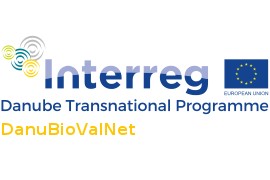

EU Project “DanubioValNet” - Interreg Danube Programme – ERDF PP12 IPE
Cross-clustering partnership for boosting eco-innovation by developing a joint bio-based value-added network for the Danube Region
Start date
01-01-2017
End date
30-06-2019
Budget in Euro
Overall: 2.320.844,8
ERDF Contribution: 1.857.124,54
IPA Contribution: 115.593,54
ENI Contribution: 0
Priority
Innovative and socially responsible Danube region
Specific objective
Improve framework conditions for innovation
DANUBIOVALNET from the Interreg Danube Translational Programme, it’s a project that aims to establish new bio-based value chains. 17 partners (including the Institute for Economic Forecasting – PP12) from the Danube region met on 1st January 2017 to pave the ground for transnational collaboration in the bio-based industry. Regional cluster organisations are expected to drive the change from a fossil fuel-based to a bio-based industry forward and will be given intensive training to help them initiate transnational networking in this sector.
The transition of a fossil-based to a bio-based industry addresses some of the main challenges identified in the Danube region. Furthermore, the eco-innovations will support the regional development by diversifying the local economy and creating new employment opportunities. The development of new bio-based value chains from primary production to consumer markets needs to be done by connecting enterprises from different regions and industries.
Therefore, the aim of this project is to develop new methods and tools to connect enterprises transnationally.

One of the planned outputs of this project will be the development of a Joint Bio-based Industry Cluster Policy Strategy (JBCS) along with a bundle of new methods and tools to support clusters for transnational working. These tools will be tested through three pilot actions; their end goal is to create new bio-based value chains in the Danube region.
The main target groups are on one hand the policy - four Ministries are involved-, on the other hand clusters and their SMEs - nine cluster organisations involved. The policy level will benefit from the JBCS which can be used as a political framework.
The clusters and SMEs will benefit from the new innovative tools and methods developed for transnational cross-clustering. Successfully established new bio-based value chains in the pilot actions can motivate other clusters and SMEs to test this newly developed approach in the future.
Project partners
|
Name |
Type |
|
Country |
|
BIOPRO Baden-Württemberg GmbH |
Lead partner |
Germany |
|
|
ClusterAgentur Baden-Wuerttemberg |
ERDF partner |
Germany |
|
|
Anteja ECG |
ERDF partner |
Slovenia |
|
|
PROUNION |
ERDF partner |
Slovakia |
|
|
Romanian Cluster Association |
ERDF partner |
Romania |
|
|
Association of Business Clusters |
ERDF partner |
Bulgaria |
|
|
National Cluster Association - CZ |
ERDF partner |
Czech Republic |
|
|
Ministry of Economy, Trade and Relations with Business Environment |
ERDF partner |
Romania |
|
|
Ministry of Entrepreneurship and Crafts |
ERDF partner |
Croatia |
|
|
Ministry of Education, Science and Sport |
ERDF partner |
Slovenia |
|
|
Croatian Wood Cluster |
ERDF partner |
Croatia |
|
|
Institute for Economic Forecasting |
ERDF partner |
Romania |
|
|
Business Upper Austria – OÖ Wirtschaftsagentur Ltd. |
ERDF partner |
Austria |
|
|
Innovation Center of Faculty of Mechanical Engineering |
IPA partner |
Serbia |
|
|
Montenegro Vine Cluster |
Associated partner |
Montenegro |
|
|
Ministry of Finance and Economics Baden-Wuerttemberg |
Associated partner |
Germany |
Newsletter
DanubioValNet – Newsletter 01/2017
DanubioValNet – Newsletter 01/2018
DanubioValNet – Newsletter 02/2017
DanubioValNet – Newsletter 03/2017
Country Reports
In this section, you will find analysis of the status quo of the consortium partner regions regarding the bio economy. The output will be a better understanding of the state-of-the-art of the VC and cluster development in bio- based industry in the PP countries and on Danube regional level (based on the participating countries). These reports will provide input for policy learnings and input for next steps in VC development.
Cluster Mapping Reports and Synthesis Value Chain Mapping Reports
The cluster and value chain mapping is established as an analytical tool for policy makers and cluster managers to better understand strength and weaknesses as well as on hot and white spots. It is also intended for SME to find proper partners to create bio-based VCs.
Cluster Mapping Synthesis Report_Bio-based Packaging
Cluster Mapping Synthesis Report_Eco-Construction
Cluster Mapping Synthesis Report_Phytopharma
Synthesis Value Chain Mapping Report_Bio-Based Packaging
Synthesis Value Chain Mapping Report_Eco-Construction
Synthesis Value Chain Mapping Report_PhytoPharma
Roadmap Reports
The Roadmapping under activity deals with future developments and trends that will impact bio-based products, applications and markets. To cope with these trends, proper framework conditions must be set up; cluster initiatives and related SME must be prepared for the upcoming challenges. The outcomes of the Roadmapping sessions will reveal where regions and clusters /SMEs are well prepared and where not, how policy can set better framework conditions, where actors have dedicated strong competencies (VC competence assessment), where are upcoming demands and new application fields, where are missing links and existing gaps and where are upcoming cross- sectoral business opportunities for SMEs within Danube region.
Roadmap Report_Bio-based Packaging
Roadmap Report_Eco-Construction
Social Media